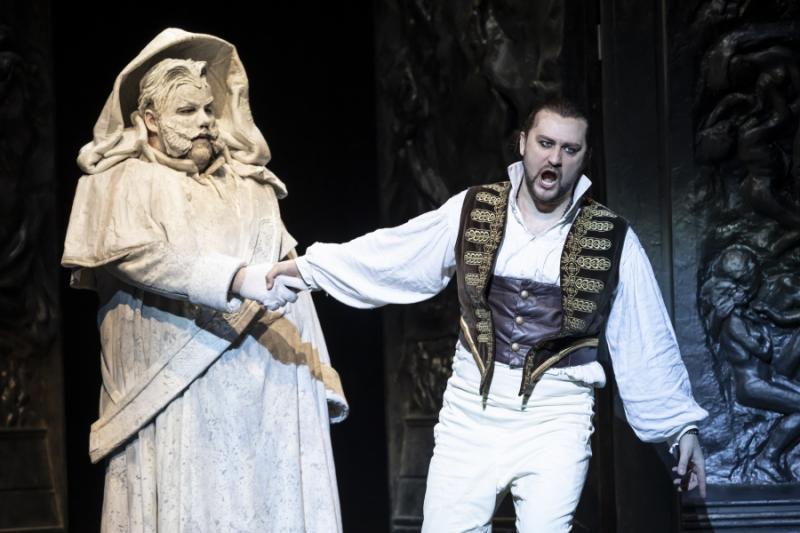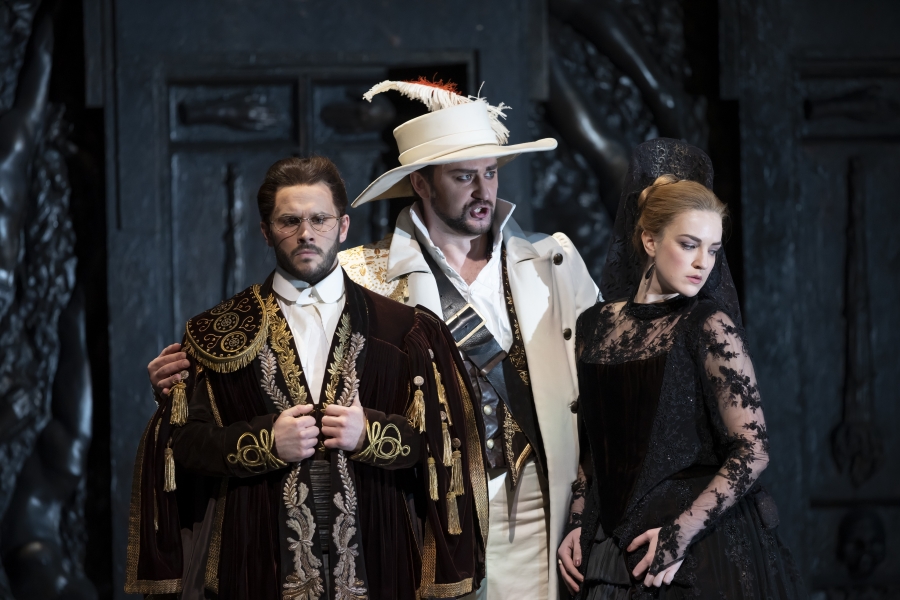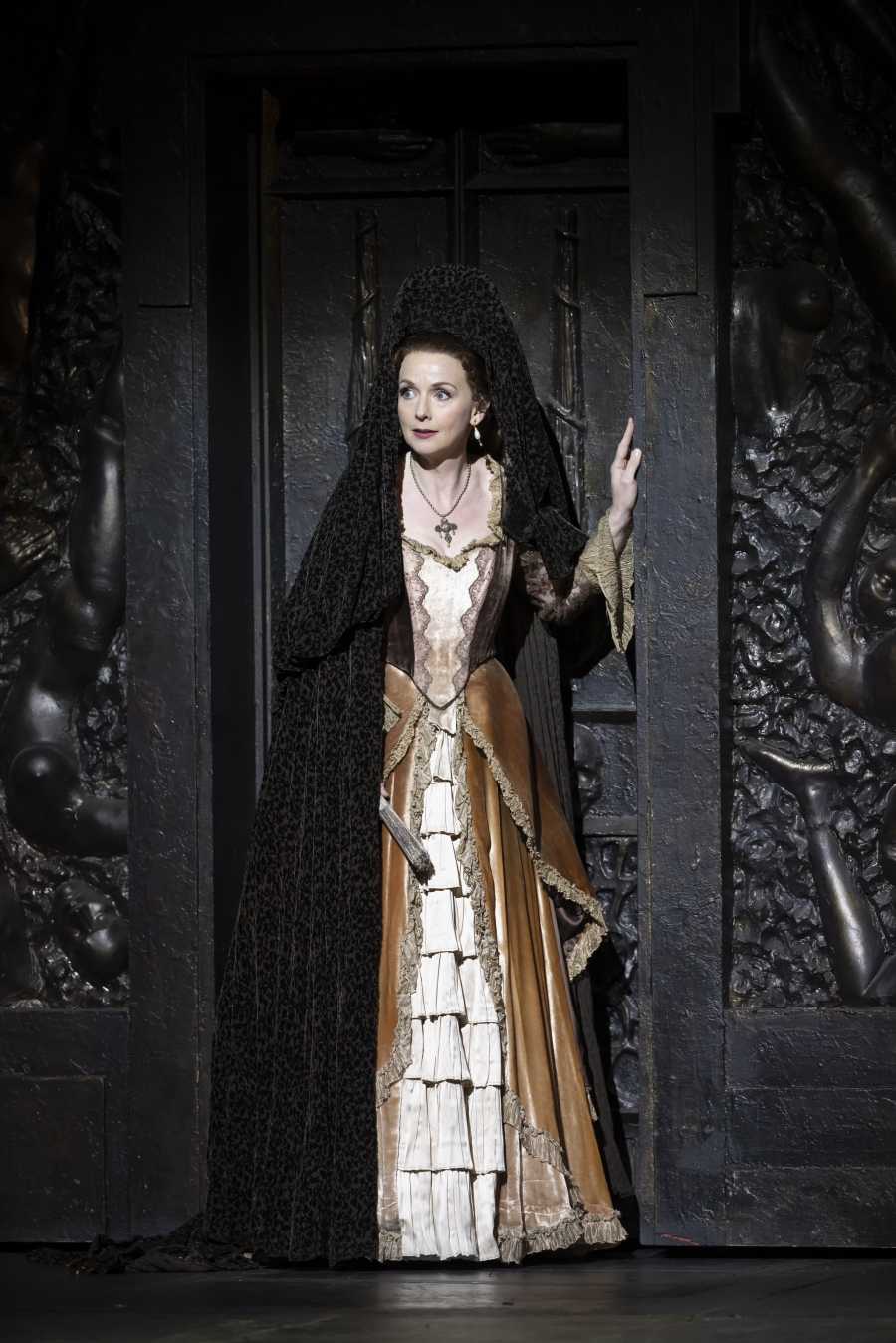Don Giovanni, Welsh National Opera review - fine young cast let down by unhelpful conducting | reviews, news & interviews
Don Giovanni, Welsh National Opera review - fine young cast let down by unhelpful conducting
Don Giovanni, Welsh National Opera review - fine young cast let down by unhelpful conducting
Greatness of Mozart shines through the polyphonic muddle

If Don Giovanni is not the greatest opera ever written, it’s at least one of the very, very few that even in erratic performances have the capacity to seem it.
Both the problems and the solution were with the music. Caird’s production, expertly reassembled here by Caroline Chaney, is a solid, intellectually unobtrusive rendering of the actual, or presumed, Da Ponte/Mozart image, 17th or 18-century Seville, a Spain of God and the Devil, of honour and grief and cowled monks, lent appropriate grandeur by John Napier’s heavy but mobile carved oak screens and bronze statues, one of which at the end is Don Giovanni himself, solidified into perpetual torment.
But before we had a glimpse of any of this, Tobias Ringborg had conducted an untidy, rough and ready overture, setting a ragged, unbalanced tone that never left the subsequent performance for longer than a few minutes here and there. Hard to pin down the reason for this. Ringborg was often inattentive to his singers, reluctant - or unaware of the need - to accommodate them in the matter of tempo, or where words or cadences called for a measure of flexibility. Nor were the orchestra, usually such an immaculate outfit, immune. From time to time ensemble was precarious, the instrumental texture confused, Mozart’s wonderful clarity of polyphony sacrificed in favour of some imaginary urgency of gesture or movement, a clumsy fortissimo here, too much brass or woodwind there.  Yet there were beautiful things as well: lovely wind playing in Donna Anna’s “Non mi dir,” where she pleads with Ottavio not to think her cruel for imposing a year’s grace on their nuptials, exquisite strings in Zerlina’s “Vedrai, carino,” sexual promise in the tenderest imaginable wrapping. But then both these arias were enchantingly sung. Spanish soprano Marina Monzó (pictured above with Trystan Llŷr Griffiths as Don Ottavio and Andrei Kymach as Don Giovanni) is one of the finest Donna Annas I’ve heard, poised and stylish, with great stage presence and lovely warm tone with just enough sheen to it. From the start she lifted the whole performance, even as she struggled with Don Giovanni on the balcony (and no smart suggestion here that she may actually have acquiesced).
Yet there were beautiful things as well: lovely wind playing in Donna Anna’s “Non mi dir,” where she pleads with Ottavio not to think her cruel for imposing a year’s grace on their nuptials, exquisite strings in Zerlina’s “Vedrai, carino,” sexual promise in the tenderest imaginable wrapping. But then both these arias were enchantingly sung. Spanish soprano Marina Monzó (pictured above with Trystan Llŷr Griffiths as Don Ottavio and Andrei Kymach as Don Giovanni) is one of the finest Donna Annas I’ve heard, poised and stylish, with great stage presence and lovely warm tone with just enough sheen to it. From the start she lifted the whole performance, even as she struggled with Don Giovanni on the balcony (and no smart suggestion here that she may actually have acquiesced).
Harriet Eyley’s Zerlina is no less touching on a lower level, and she catches precisely the agony of the honest but flighty peasant girl momentarily star-struck, lured into near disaster, rescued by music. Both her arias are among the loveliest things in all Mozart, and they both sounded it on this occasion.
 But this is throughout a potentially strong, young cast (doubled, it needs saying, by a no doubt excellent second cast that alas I haven’t heard). Andrei Kymach, the 2019 Cardiff Singer of the World winner, is an arresting, dangerous, even violent Giovanni, with plenty of fine, ringing tone, brilliantly athletic in “Fin ch’an dal vino,” sweet and alluring in “Deh, vieni” abetted by a mandolinist monk, a wicked touch that will have Messrs Caird and Chaney in trouble with St.Peter. Kymach suffered more than most from Ringborg’s waywardness, though the Donna Elvira, Sarah Tynan (pictured right), also had her moments and survived them well, except perhaps in “Ah, fuggi il traditor,” her Handelian warning to poor Zerlina, which Ringborg rushed almost off its feet.
But this is throughout a potentially strong, young cast (doubled, it needs saying, by a no doubt excellent second cast that alas I haven’t heard). Andrei Kymach, the 2019 Cardiff Singer of the World winner, is an arresting, dangerous, even violent Giovanni, with plenty of fine, ringing tone, brilliantly athletic in “Fin ch’an dal vino,” sweet and alluring in “Deh, vieni” abetted by a mandolinist monk, a wicked touch that will have Messrs Caird and Chaney in trouble with St.Peter. Kymach suffered more than most from Ringborg’s waywardness, though the Donna Elvira, Sarah Tynan (pictured right), also had her moments and survived them well, except perhaps in “Ah, fuggi il traditor,” her Handelian warning to poor Zerlina, which Ringborg rushed almost off its feet.
I could go on. Simon Bailey’s Leporello is a genuine foil to Kymach, strong and weak, an incisive embodiment of the power of self-interest (after all, he gets a few girls himself, offering them his protection, as he puts it, in mockery of the Don’s own tactic). Trystan Llŷr Griffiths is that rarity, an almost convincing Ottavio, honour without action, but with musical spirit at least, perhaps tending a shade flat in “Dalla sua pace,” entirely excellent in “Il mio tesoro,” delivered to whoever will listen as the stage gradually empties: he is, after all, a bore, and meant to be. James Atkinson is a fine upstanding Masetto who could give as good as he gets if it weren’t for his lack of social standing. Finally the Commendatore, James Platt, though too small for his stone cowl, resolves everything in a powerful closing scene that nearly lets one forget the earlier troubles.
Having started with a grumble, I’ll end with one for good balance. One ought to be spared, in a serious opera house like the Millennium Centre, the horror of pop music blaring out in the foyers and (for heaven’s sake) the lavatories, as one emerges from some of the most sublime music ever composed. The Welsh pride themselves on their musicality. Here’s an opportunity to back up the claim.
Add comment
The future of Arts Journalism
You can stop theartsdesk.com closing!
We urgently need financing to survive. Our fundraising drive has thus far raised £49,000 but we need to reach £100,000 or we will be forced to close. Please contribute here: https://gofund.me/c3f6033d
And if you can forward this information to anyone who might assist, we’d be grateful.

Subscribe to theartsdesk.com
Thank you for continuing to read our work on theartsdesk.com. For unlimited access to every article in its entirety, including our archive of more than 15,000 pieces, we're asking for £5 per month or £40 per year. We feel it's a very good deal, and hope you do too.
To take a subscription now simply click here.
And if you're looking for that extra gift for a friend or family member, why not treat them to a theartsdesk.com gift subscription?
more Opera
 First Person: Kerem Hasan on the transformative experience of conducting Jake Heggie's 'Dead Man Walking'
English National Opera's production of a 21st century milestone has been a tough journey
First Person: Kerem Hasan on the transformative experience of conducting Jake Heggie's 'Dead Man Walking'
English National Opera's production of a 21st century milestone has been a tough journey
 Madama Butterfly, Irish National Opera review - visual and vocal wings, earthbound soul
Celine Byrne sings gorgeously but doesn’t round out a great operatic character study
Madama Butterfly, Irish National Opera review - visual and vocal wings, earthbound soul
Celine Byrne sings gorgeously but doesn’t round out a great operatic character study
 theartsdesk at Wexford Festival Opera 2025 - two strong productions, mostly fine casting, and a star is born
Four operas and an outstanding lunchtime recital in two days
theartsdesk at Wexford Festival Opera 2025 - two strong productions, mostly fine casting, and a star is born
Four operas and an outstanding lunchtime recital in two days
 The Railway Children, Glyndebourne review - right train, wrong station
Talent-loaded Mark-Anthony Turnage opera excursion heads down a mistaken track
The Railway Children, Glyndebourne review - right train, wrong station
Talent-loaded Mark-Anthony Turnage opera excursion heads down a mistaken track
 La bohème, Opera North review - still young at 32
Love and separation, ecstasy and heartbreak, in masterfully updated Puccini
La bohème, Opera North review - still young at 32
Love and separation, ecstasy and heartbreak, in masterfully updated Puccini
 Albert Herring, English National Opera review - a great comedy with depths fully realised
Britten’s delight was never made for the Coliseum, but it works on its first outing there
Albert Herring, English National Opera review - a great comedy with depths fully realised
Britten’s delight was never made for the Coliseum, but it works on its first outing there
 Carmen, English National Opera review - not quite dangerous
Hopes for Niamh O’Sullivan only partly fulfilled, though much good singing throughout
Carmen, English National Opera review - not quite dangerous
Hopes for Niamh O’Sullivan only partly fulfilled, though much good singing throughout
 Giustino, Linbury Theatre review - a stylish account of a slight opera
Gods, mortals and monsters do battle in Handel's charming drama
Giustino, Linbury Theatre review - a stylish account of a slight opera
Gods, mortals and monsters do battle in Handel's charming drama
 Susanna, Opera North review - hybrid staging of a Handel oratorio
Dance and signing complement outstanding singing in a story of virtue rewarded
Susanna, Opera North review - hybrid staging of a Handel oratorio
Dance and signing complement outstanding singing in a story of virtue rewarded
 Ariodante, Opéra Garnier, Paris review - a blast of Baroque beauty
A near-perfect night at the opera
Ariodante, Opéra Garnier, Paris review - a blast of Baroque beauty
A near-perfect night at the opera
 Cinderella/La Cenerentola, English National Opera review - the truth behind the tinsel
Appealing performances cut through hyperactive stagecraft
Cinderella/La Cenerentola, English National Opera review - the truth behind the tinsel
Appealing performances cut through hyperactive stagecraft
 Tosca, Royal Opera review - Ailyn Pérez steps in as the most vivid of divas
Jakub Hrůša’s multicoloured Puccini last night found a soprano to match
Tosca, Royal Opera review - Ailyn Pérez steps in as the most vivid of divas
Jakub Hrůša’s multicoloured Puccini last night found a soprano to match

Comments
The Masetto last night was
It seems the amendment has
It seems the amendment has been made - thanks for pointing out the proper name. Music Ed.